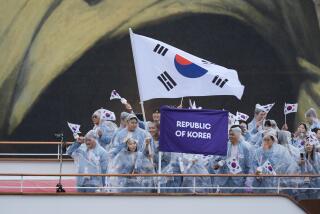North Korea is playing a new tune as it gears up for the Winter Olympics
Reporting from Seoul — The parties negotiating North Korea’s role in the Winter Olympics secured a promising but vague deal last week, and agreed to settle the details before the Games begin next month.
One key detail — at least for the North — emerged Monday.
The totalitarian nation plans to send a 140-member orchestra to South Korea as part of its overall delegation, the total size of which remains uncertain, both parties in the latest round of inter-Korean talks agreed Monday.
The latest deal, announced by South Korea’s Unification Ministry, will allow the North’s Samjiyon Orchestra to hold performances in both Seoul and Gangneung, a city about 100 miles east of Seoul that’s hosting Olympics events such as figure skating and ice hockey.
The parties are expected to meet again on Wednesday at Panmunjom, a diplomatic outpost in the demilitarized zone, to seek agreement on other details — such as the number of athletes, fans and government officials who will also attend the Games, which begin Feb. 9.
The South had originally hoped to discuss those central issues on Monday, but the North insisted that both sides first negotiate the participation of its art troupe.
“We believe that a great symphony will be enthusiastically received,” Kwon Hyok Bong, one of the North’s negotiators, said as the meeting opened. “We hope that the talks could go smoothly so as to help our art troupe perform well in the South.”
The two sides also agreed to settle specific plans for the orchestra — venues, stage conditions and equipment issues — “amicably” before the Games. The North is expected to send an advance team soon to plan the performances, the South’s Unification Ministry said in a statement.
“The South will ensure the safety and convenience of the North’s performing squad to the utmost extent,” according to the statement.
The details about the musicians in the 140-member group remained unclear immediately after the negotiations. It’s possible that the North’s artistic troupe will include the Moranbong Band, an all-female group formed in 2012 under the supervision of the nation’s leader, Kim Jong Un. It’s been called North Korea’s version of the Spice Girls. The band’s leader, Hyon Song Wol, attended the talks, but South Korean officials said the full list of participating musicians hasn’t yet been shared.
The art troupe’s participation is the latest detail to emerge from the inter-Korean talks, which had stalled for two years until last week. The breakthrough came after Kim expressed an interest in the Olympics during a New Year’s Day speech.
The South quickly offered dialogue in an effort to secure the North’s participation. The two nations, parties to a 1953 truce that halted fighting in the Korean War but divided the peninsula, then negotiated a historic deal for the North’s participation on South Korean soil.
While the art troupe agreement settles some questions about the composition of the North’s delegation, details about its athletes’ participation remain unclear. Both nations were scheduled to meet later this month with International Olympic Committee officials to discuss those plans.
Two of its figure skaters initially qualified for the Games, for example, and it’s also possible that the two nations might dress an inter-Korean women’s hockey team.
The North, which is isolated and facing sanctions because of its illicit development of ballistic missiles and nuclear weapons, hadn’t attended a Winter Olympics since 2010. It boycotted the last Olympics held in South Korea, in the summer of 1988, though it has attended a few international sporting events hosted by its neighbor in recent years.
The talks so far have focused on the upcoming Games, but officials in Seoul, Pyongyang and Washington have expressed hope that they might lead to decreased tensions on the peninsula — and perhaps someday make conditions for discussing a broader deal on the North’s weapons possible.
The talks so far have largely been amicable, with officials from both sides using earnest language about the nations’ shared history and desire for ultimate unification.
Some tensions remain, however.
During last week’s talks, the North’s negotiators bristled when the South mentioned denuclearization, a key priority for both Seoul and its chief ally, the United States.
The North also issued a threat to back out of the Games after the South’s president, Moon Jae-in, credited President Trump with creating an environment through international pressure that made the talks possible.
“They should know that train and bus carrying our delegation to the Olympics are still in Pyongyang,” according to a Sunday report in the North’s state media. “The South Korean authorities had better ponder over what unfavorable results may be entailed by their impolite behavior.”
Such a decision, however, would prevent the world from hearing the North’s famed orchestra — and perhaps seeing a few of its winter sports athletes.
Stiles is a special correspondent.
More to Read
Sign up for Essential California
The most important California stories and recommendations in your inbox every morning.
You may occasionally receive promotional content from the Los Angeles Times.











